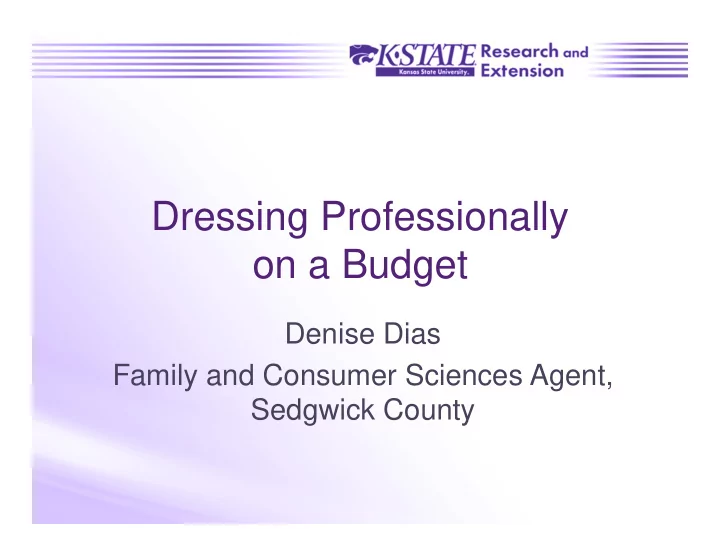

Dressing Professionally on a Budget Denise Dias Family and Consumer Sciences Agent, Sedgwick County
What is Acceptable for Work?
What we will cover today • First Impressions • What is Business Casual? • Creating a Seasonless Wardrobe • Wardrobe Planning
“You never have a second chance to make a first impression.”
First Impressions First impressions are extremely important, especially in the business world. In order to make a good first impression , you need to dress professionally and separate your social image from your professional presence.
Your Professional Presence • Social vs. Professional Appearance – What you wear off the job or socially doesn't have to be what you wear at work. • Perfume and Cologne – Even if you smell good, scent can be an issue. • Tattoos and Piercing – Depending on your workplace, consider covering tattoos and removing piercing rings.
Little Details that Matter • Clothes should be neat and clean • Shoes in good condition • Hair clean and neatly styled • For women: makeup should be subtle • Nails are clean, neat and of reasonable length • Dress for the job you want
Rules for Casual Dress at Work Casual dress policies are often confusing !
Simple Rules • Casual doesn't mean sloppy. • Simple solution: khakis and a sport shirt or sweater. • Going to a meeting or making a presentation? Professional attire only.
Business Casual Dress Code Not all casual clothing is suitable for the office, for example: – Clothing that reveals too much. – Anything wrinkled, torn, dirty, or frayed. – Any clothing with offensive words, terms, or pictures. – Hats, except head covers required by religion or culture Sports team, university, and fashion brand names on clothing are generally acceptable.
What Not to Wear to Work • Flip-flops, sneakers • Any visible underwear • Shorts • Jeans • Low-rise or very tight pants • Low-cut, midriff-baring or tight tops
Trendy vs. Classic • Buy classic styles. • A suit that will last for years is a better investment than trendy attire. • Err on the side of dressing conservatively. • Big ticket items – suits, dresses, coats – buy classic styles. • Accessories – buy trendy but inexpensive accessories bright seasonal colors.
Find Affordable Clothes • Clearance racks • Outlet stores • Goodwill/Disabled American Veterans • Borrow • Second-hand/thrift shops • Yard/garage sales • Naked Lady Swap Meets (What’s that?)
Creating a Seasonless Wardrobe • Mix and match key pieces • No two pieces should be the same, but they should coordinate • Accessories pull the look together
Take Inventory • Take an inventory of your closet and make a list of things you need. • Buy the best quality you can afford.
Wardrobe Planning • Get organized • Evaluate your present wardrobe • Decide on a basic color plan = Neutrals • Plan for variety and flexibility • Determine your clothing budget • Buy basic styles • Find good quality • Take care of the clothes you have!
Make the Most of Your Wardrobe • 5-piece wardrobe = 6 looks • 8-piece wardrobe = 30 looks • 9-piece wardrobe = 42 looks
Five-Piece Wardrobe • 1 jacket • 1 blouse • 1 short skirt • 1 long skirt • 1 pair of pants
Eight-Piece Wardrobe • 2 jackets • 1 pants • 1 short skirt • 2 long skirts • 2 tops
Nine-Piece Wardrobe • 2 jackets • 2 blouses • 1 shirt • 1 pair of pants • 2 long skirts • 1 short skirt
Clothes communicate nonverbally. Learning to dress professionally is a process, not an event.
Resources • Basic Apparel Management , S134H, K-State Research and Extension publication • Basic Job Ready Skills , S134A, K-State Research and Extension publication • Basic Health and Wellness , S134D (Spanish S134DS), K-State Research and Extension publication • Diana Pemberton-Sikes – http://www.FashionForRealWomen.com. • Dress Well with a Tight Budget – http://ezinearticles.com/?Dress-Well-with-a-Tight-Budget&id=174381 • Clothes Make the Man or Woman – http://careerplanning.about.com/cs/dressingforwork/a/dress_success.htm • What Not to Wear on a Job Interview – http://jobsearch.about.com/od/interviewattire/a/interviewnot.htm • Dress for Work Success – http://humanresources.about.com/od/workrelationships/a/dress_code.htm Kansas State University Agricultural Experiment Station and Cooperative Extension Service EP160 August 2009 K-State Research and Extension is an equal opportunity provider and employer. Issued in furtherance of Cooperative Extension Work, Acts of May 8 and June 30, 1914, as amended. Kansas State University, County Extension Councils, Extension Districts, and United States Department of Agriculture Cooperating, Fred A. Cholick, Director
Recommend
More recommend